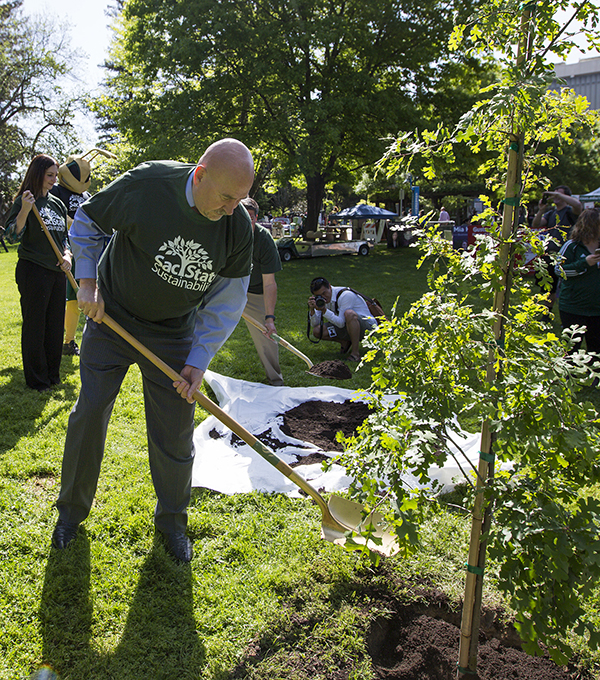 President Robert S. Nelsen joins in Sac State's Earth Day celebration. (Sacramento State/Rob Neep)
President Robert S. Nelsen joins in Sac State's Earth Day celebration. (Sacramento State/Rob Neep)Sacramento State President Robert S. Nelsen has signed four historic documents that reflect his – and the University’s – expanding commitment to sustainability on the local and global stages.
“At Sacramento State, we hold ourselves accountable to the highest standards of environmental stewardship,” he says.
This summer, he joined more than 1,200 government, business, and higher education leaders in signing the “We Are Still In” statement, taking a stand against President Donald Trump’s decision to withdraw the United States from the Paris Climate Agreement. He also signed the “Put a Price on It” carbon-pricing endorsement initiative, calling on elected representatives to make carbon-intensive industries pay a fair share of the costs of pollution they create.
In December 2016, Nelsen joined the chancellors and presidents of more than 170 U.S. colleges and universities – including California State University Chancellor Timothy P. White – in signing an open letter on climate action directed at the then-incoming Trump administration.
And a few months earlier, Nelsen added his name to Second Nature’s Carbon Commitment, pledging to reduce greenhouse gas emissions and achieve carbon neutrality on the Sacramento State campus.
“I believe that we, as a University and as citizens of the world, have to take responsibility for our actions today to ensure we are creating a better world tomorrow,” Nelsen says. “Institutions of higher education are places where scientific advancements are made and solutions to global problems are realized.
“Climate change is one of the greatest issues facing our planet,” he adds. “Therefore, as one of the largest campuses within the CSU, we have an obligation not only to reduce our environmental impact but to create an environment where sustainability becomes so engrained in our culture that it is not just what we do, but who we are.”
Sac State was named the CSU’s most sustainable campus in 2016 by AASHE (the Association for the Advancement of Sustainability in Higher Education). The association praised the aquaponics project at STORC (the Sustainable Technology Optimization Research Center), Peak Adventures’ refillable propane tank program, and the medications disposal bin at The WELL’s pharmacy.
The University's sustainability projects continue to earn high-profile recognition:
- The Princeton Review awarded Sac State a place on its 2017 Green Honor Roll.
- The California Stormwater Quality Association (CASQA) last year named the cutting-edge Campus LID (low-impact development) Project one of the best in the state, and the American Society of Civil Engineers, Sacramento section, called it the region’s top urban development project.
- The campus's closed-loop project, which takes food waste from the Dining Commons and converts it to clean bio-CNG (compressed natural gas) to fuel the eight Hornet Shuttles, is earning the University major awards: This year, Breathe California named Sac State a "Clean Air Champion," and, at the 2016 CSU Facilities Management Conference, Sac State received the Best Practice Sustainability Award.
- Also in 2016, the closed-loop and aquaponics projects won best-practice awards at the California Higher Education Sustainability Conference competition, and the CSU Chancellor’s Office gave Sac State a best-practice award for the comprehensive organic-waste diversion program.
"Sustainability at Sac State has grown immensely under President Nelsen’s leadership,” says Ryan Todd, the University’s sustainability manager. “It is refreshing to see that even after drastic changes in the federal political climate, (President Nelsen) has been unwavering in Sac State’s commitment to building a sustainable future."
Sac State receives major funding to boost its commitment to sustainability. Last year, for example, the CSU gave Sacramento State an $80,000 “Campus as a Living Lab” (CALL) grant, which has allowed the University to integrate sustainability concepts and theories into academics.
In addition, Professor Kelly Thompson is working with Family and Consumer Sciences students to plant a vegetable garden at the BAC (Bioconversion and Agricultural Collaborative) Yard. They’re growing produce to be served Sept. 13 at Sac State’s Farm-to-Fork Dinner on the Guy West Bridge.
And the University’s landscape continues to change in the name of sustainability. This summer, grounds crews removed turf from four campus locations, creating beautiful rock gardens that will lessen the need for irrigation and save nearly 1 million gallons of water annually at those locations.
To learn more about Sac State Sustainability: www.csus.edu/aba/sustainability. – Dixie Reid
